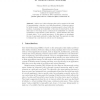210 search results - page 4 / 42 » An analysis of reinforcement learning with function approxim... |
120
click to vote
ATAL
2005
Springer
15 years 5 months ago
2005
Springer
Reinforcement learning problems are commonly tackled with temporal difference methods, which use dynamic programming and statistical sampling to estimate the long-term value of ta...
104
click to vote
ICCBR
2005
Springer
15 years 5 months ago
2005
Springer
CBR is one of the techniques that can be applied to the task of approximating a function over high-dimensional, continuous spaces. In Reinforcement Learning systems a learning agen...
ESANN
2007
15 years 1 months ago
2007
The eligibility trace is one of the most used mechanisms to speed up reinforcement learning. Earlier reported experiments seem to indicate that replacing eligibility traces would p...
115
click to vote
AAAI
2006
15 years 1 months ago
2006
Reinforcement learning problems are commonly tackled with temporal difference methods, which attempt to estimate the agent's optimal value function. In most real-world proble...
IWANN
1999
Springer
15 years 3 months ago
1999
Springer
To avoid the curse of dimensionality, function approximators are used in reinforcement learning to learn value functions for individual states. In order to make better use of comp...

